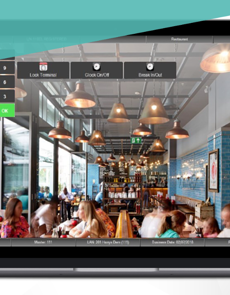Why cheap EPoS could end up costing you more
Arguably the POS system is the most important tech for restaurants and hospitality businesses. It’s usually one of the first tech solutions that’s adopted at the earliest stages of business development, but that often means that the tech that’s chosen is quickly outgrown as more sites open and the business grows. Sometimes there’s some misplaced apathy surrounding replacing a POS system that ‘does the job’ - but this is not a great long-term strategy.
The POS at the heart of the restaurant, pub, diner, bar or other food and beverage operation and is the gateway to delivering excellent customer service, faster service times, keeping your stock in check and making informed and reactive business decisions. It can even affect how often your customers visit.
Here at Access, we often talk to small businesses who are looking to keep investment costs down when it comes to tech and how that for them, it’s all about price. As well as larger operators who are trepidatious about the work and cost involved in upgrading their EPoS system.
In this article, we’ll talk about the reasons why choosing a cheap EPoS system isn’t always the best decision and the other things you should consider when choosing one, as well as some of the common mistakes frequently made when selecting a new EPoS system.
Reasons for choosing a cheap EPoS
So, what makes an operator prioritise cost when choosing an EPoS system well, aside from the obvious answer of: it’s cheaper!
Let’s look at some of the common themes we hear from operators:
- Budget constraints: Sometimes it simply comes down to budget. Functionality is sometimes compromised to get a system that fits the price point. For smaller or newer operators, this can often be the case. Although we would always recommend talking to the software provider to find out what can be achieved within your budget regardless of the displayed price, a good provider should be able to tailor and customise your package to fit your current needs, with the ability to develop functionality later as you grow.
- Short-term savings: A cheap EPoS system can appear to offer immediate cost savings that appeal to operators looking to minimise initial investment. Don’t be distracted by savvy sales tactics though – check that the functionality you need is covered in the base price and look out for introductory offer periods, so you don’t get stung later down the line. In addition, the short-term savings of a cheaper EPoS system may be mitigated by higher long-term expenses due to maintenance, upgrades, and other inefficiencies.
- Lack of product knowledge: Some operators are focused on the basic functionality of a POS system, such as accepting customer payments, and may not fully comprehend the long-term implications of investing in a cheap EPOS system. As your business grows and you look to develop your business strategies, a system with limited functionality can hinder your efforts through a lack of integrations with other software. We would recommend operators look as long-term as possible. What's the 2-, 5- and 10-year plan – and does your chosen EPoS support that growth?
Common mistakes to avoid when choosing an EPoS system
You might be wondering how operators can strike the perfect balance between a budget-friendly EPoS system and one that offers the best functionality and ability to grow with the business.
Let us fill you in on some of the common mistakes we see when operators are choosing an EPoS system.
- Not assessing business needs: The quest for a cheap EPoS system sometimes means the specific operational needs of your restaurant or hospitality business aren’t met. The people in charge of choosing an EPoS system are not usually the ones using it day to day, and a system that doesn’t offer functionality that is needed daily can be frustrating for staff and lead to lost revenue opportunities. Does your restaurant often cater to large bookings that need to split the bill? Are you able to effectively offer upsell prompts to enhance order values? Is the system easy to use to input or modify orders? Is service speed being affected by a slow system?
- Ignoring Integration capabilities: Overlooking the importance of integrations with other systems such as customer engagement software like loyalty, bookings, CRM and customer feedback systems can potentially hinder communications and marketing efforts with your existing customers, by not sourcing the valuable sales data about your customers that help you tailor and customise your messaging. Depending on your business model you may consider the importance of omni-channel ordering, will your current EPoS system support mobile and third-party delivery partner ordering? Ignoring the integration capabilities when choosing an EPoS can lead to significant headaches and revenue loss later down the line.
- Neglecting future scalability: Your operation’s EPoS system can pave the way for future growth potential, from diversifying your offer to accept orders from multiple channels to developing your marketing strategy to offer tailored campaigns or what kind of loyalty programme you can use. Choosing an EPOS system solely based on current needs without considering future growth can lead to costly migrations or system replacements in the future.
- Not prioritising security: Sacrificing security features in favour of lower costs can expose your business to data breaches and compliance issues, ultimately costing more in terms of reputation damage and potential fines. And in a similar vein some PoS systems can be vulnerable to outage and connection issues, business-critical issues that can have a severe effect on your operations.
What is the cheapest epos system for restaurants?
When it comes to what is actually the cheapest EPoS system available for restaurants and other hospitality businesses, it mainly comes down to what functionality you’re looking for – and this will largely be dictated by the size of the business.
For many SMEs, a basic but functional product with low upfront and license fee costs is quite popular. For larger enterprises, the list of functionalities and requirements is usually longer. We’ve taken a quick look at some of the Ireland’s hospitality EPoS offers to help you determine which are the cheapest. It’s worth noting that across these providers there are vast differences to their offers either in terms of functionality, included hardware, and ongoing service and support, so you’ll need to do your research carefully to determine which offer suits your needs.
Eposdirect – At the lower end of the price scale, Eposdirect advertises a POS solution at a fixed cost of €1199 for the hardware with no ongoing license fees and an option to spread the cost over four payments. With no ongoing costs after the initial investment this is one of the cheapest options when choosing a singular EPoS system.
Goodtill by Sumup – Offering a basic core POS from €32 with optional modules starting at €10 and separate costs for hardware, delivering a highly custom model that does make it a little harder to work out cost based on the displayed price, as it depends on what you need.
Eposnow – Advertising ‘everything in one package’ for their core POS offering starts at €399.
Lightspeed – Offer three standard plans with the option to pay monthly or annual fees that can be calculated by several sites and registers. Foplay separately.
Access EPoS – From just 368.30€ (£316) per site per month for two terminals, Access enhanced with event ticketing and eVouchers to help operators boost revenue opportunities. Add KDS and Menu Manager modules from 16.32€ (£14) pm and 34.96€ (£30) pm respectively, as well.
All these prices are as advertised on the software provider’s respective website and are accurate as of 04/12/2024.
Ready to discover a complete, affordable EPoS solution?
In this article, we’ve looked at the reasons why hospitality operators should always consider factors beyond cost when choosing an EPoS system. The long-term benefits of investing in a reliable and feature-rich EPoS solution that aligns with the specific needs and goals of your business can help you to develop your business operation, be more profitable, and offer a better experience to guests.
As we said right at the beginning, the POS system might be the most important piece of tech in your whole operation. Your sales data can help inform marketing strategy, customer experience, and stock control, and making sure that data is connected to other systems in your operation is often key.
Talk to our knowledgeable sector experts about your operation’s needs, now and in the future, to discover what Access EPoS can do for you.
Find out more about hospitality EPoS
Learn more about EPoS
Related resources to support you in understanding more about EPoS systems in hospitality, driving efficiency and running a more profitable business




